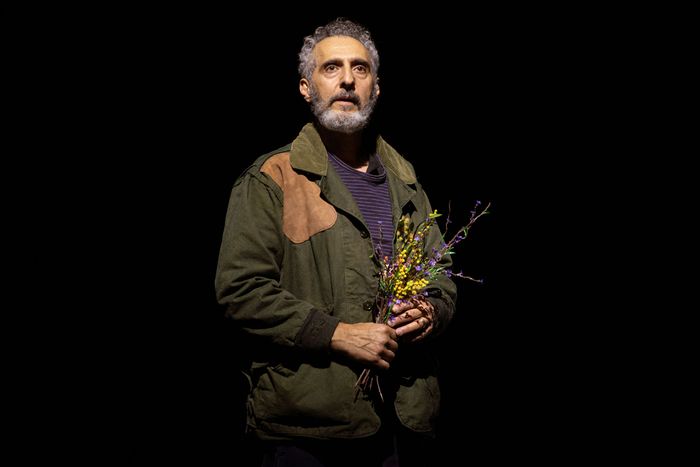
A play starring actors like John Turturro and Elizabeth Marvel, based on an acclaimed ÔÇö and, more importantly, filthy ÔÇö novel, should not make only a small impression. But the mystery of the New GroupÔÇÖs adaptation of SabbathÔÇÖs Theater is that it struggles to shock you or even to stick in your memory. The production is a faithful-to-a-fault adaptation of Philip RothÔÇÖs novel, by Turturro and the author Ariel Levy, that gets stuck in translation. ItÔÇÖs the story of a chronically, self-destructively passionate man, but its writers canÔÇÖt figure out how to render that fire onstage. The raw materials are there, but the spark is lacking.
The play begins, Rothily enough, with sex: You hear moans behind a curtain, onto which thereÔÇÖs some projected yonic imagery of rippling water, before it falls to reveal Turturro and Marvel, just after climax. Turturro is Mickey Sabbath, a perpetually horny puppeteer who careers from affair to affair, and Marvel, in this scene, is his Croatian emigr├® mistress Drenka, who has a sexual appetite that is nearly a match for SabbathÔÇÖs. But sheÔÇÖs not long for this world or this play. Her cancer diagnosis and subsequent death kicks off what little plot there is in SabbathÔÇÖs Theater, sending Mickey on a soul-searching quest through his relationships, past and present. Marvel reappears as the many other women in his life, including his wives and his mother, while Jason Kravits plays a series of friends and social rivals. Both are very good, and Marvel ÔÇö gifted at playing any given domineering figure ÔÇö slips into DrenkaÔÇÖs louche posture like sheÔÇÖs cutting into a nicely cooked steak and then cycles through seemingly every accent available on the Eastern Seaboard. Despite her attempts to differentiate everyone, though, the multiple casting becomes dramatically confusing: ThereÔÇÖs a thematic point in having Sabbath not be able to tell the women in his life apart, but it gets obscured by the way this production tries to follow the bookÔÇÖs slippery structure.
SabbathÔÇÖs Theater, on the page, follows the through-line of SabbathÔÇÖs emotional state as it jumps among present events ÔÇö a trip into the city, a friendÔÇÖs funeral ÔÇö and recollections of the past. Onstage, however, that stream of consciousness is blurry. In their script, Turturro and Levy, a first-time playwright, tend to alternate between monologues from Sabbath and dramatic action, and the latter tends to occur in a blurred temporality with SabbathÔÇÖs memories sometimes overlapping with his present. The monologues give Turturro little stand-up sets to work with, and he delivers them like┬áa charming but ornery uncle. HeÔÇÖs good at RothÔÇÖs diatribes, whether about the state of America or his attraction to a particular womanÔÇÖs particular body part, and can hook the audience with his charm, even when heÔÇÖs being his most vulgar. But those kinds of asides become crutches when you return to them too often, as this production does. His Mickey keeps telling us who he is, instead of showing.
The scenes around them falter, often because, with so much space taken up by monologuing, thereÔÇÖs just not enough action. In a novel, you can pump tons of interiority and character observation into a small interaction ÔÇö say, an encounter on the subway between Sabbath and someone who reminds him of his ex-wife ÔÇö but onstage, we often literally need more movement. This adaptation, hewing so close to the book, doesnÔÇÖt expand, and nor does Jo Bonney, directing, find a way to supply that dynamism: Her blocking, even in the sex scenes, is rigid and careful. A bit of public masturbation by a gravesite, rendered in dim blue light as Turturro faces away from the audience, with a splatter of ejaculate rendered through projections (by Alex Basco Koch), gets a few predictable titters from the audience but never feels as edgy as itÔÇÖs presumably meant to. ItÔÇÖs all cast over with portentous seriousness where you want something more venal or even darkly comic. A similar hitch occurs at the end of the play, when Turturro appears fully naked, draped in an American flag (an image youÔÇÖll see on the showÔÇÖs poster). The onstage nudity, jarring and provoking as it so often is, gets a gasp from the audience ÔÇö but Turturro disrobes so carefully and itÔÇÖs all so encased in foreshadowing that itÔÇÖs never as daring as I think itÔÇÖs meant to be.
The sticking point here might be reverence. Turturro was a friend of RothÔÇÖs, and in an interview with the New York Times, he and Levy talked about doing this play now to honor the novelist. He admits that his mannerisms as Sabbath even echo RothÔÇÖs. ThatÔÇÖs a worthy impulse, but reverence doesnÔÇÖt suit a novel where the main character spends most of his time flipping off the universe. Watching Sabbath, I was reminded of Laura LinneyÔÇÖs monologue in My Name Is Lucy Barton, another adaptation with top-line talent that tripped on its own regard for the original material. There, there was at least the excuse that the novel itself is atmospheric and mysterious. SabbathÔÇÖs Theater should be sexy and off-putting. The book, after all, has a whole loving description of piss play. Onstage as in print, itÔÇÖs mediated through a bedside reflection between Sabbath and Drenka, but where that mediation in fiction adds a useful complicating layer, here it keeps us at a remove. A play has to tear through a novelÔÇÖs layers of skin, which almost always means mangling it in the process of rendering something new. Turturro, Levy, and Bonney give us the original at a respectful distance ÔÇö a pity, because graffiti-tagging a classic would be a pretty Philip Roth thing to do.
SabbathÔÇÖs Theater is at the Pershing Square Signature Center.


